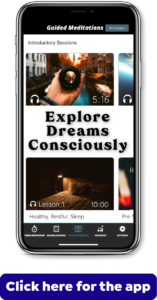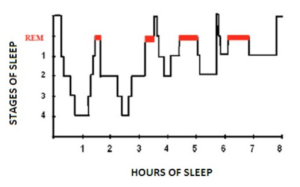Understanding Memory of Lucid Dreams
In this article, we’re going to cover the fundamentals of dream recall including lucid vs non-lucid dream recall, how to improve memory of lucid dreams, and a certain type of memory involved  with lucid dreaming practice.
with lucid dreaming practice.
If you are a lucid dreamer, is your memory of lucid dreams better than it is for your non-lucid dreams?
Many people think they don’t dream or that they hardly ever dream. At the level of personal experience, if you have no recollection of dreaming, why would you assume any dreaming took place at all? Of course, it’s understandable that people assume they don’t dream, but it just isn’t true.
Every night when we go into REM sleep, we have high-resolution dreams for an average total of 2 hours per night. When it comes to remembering dreams upon awakening, think of it simply as a skill. Like all skills, for some people, it comes easily while for others it takes different degrees of practice, patience, and perseverance.
Prospective Memory for lucid dreaming
To put it simply, prospective memory is purposefully remembering to do something in the future. With some conscious effort, we have the ability to set internal reminders – yes, just like we can set reminders on our phones…
Prospective memory works almost like a code or a script; you assign an IF, THEN script to your own mind – for example, “IF I see something weird, unusual, or inexplicable (a dreamsign), THEN do a reality test to see if I am dreaming”… or “IF I wake up in the morning, THEN focus on what I was just dreaming about, and THEN write it down in the journal”.
Ever wake up a minute or two before your alarm goes off? If so, that probably occurred when you had something really important going on that day. This is a very common phenomenon and given this occurs during sleep, it’s a subconscious ability. Our subconscious mind helps us make sure we don’t oversleep when we have something urgent ahead of us.
But the reason this is so useful for lucid dreamers is: WE decide what’s important enough for that subconscious mechanism to work. ‘Important’ is subjective, specific to the individual. The more urgent we deem attaining lucidity during a dream or recall dreams upon awakening, the more likely our it is that our prospective memory will fulfill the request.
Improving Memory of Lucid Dreams
What’s the point of having a lucid dream if you don’t remember it? Typically, because of the excitement that comes with achieving lucidity, we tend to remember lucid dreams more clearly than non-lucid dreams.
But this doesn’t mean we reliably remember all the lucid dreams we have. And what a shame it’d be to get lucid during a dream, and then keep sleeping long enough to forget all about it!
Here are our top tips and exercises for improving memory of lucid dreams… These tips also apply to non-lucid dreams as well.
6 Tips for Improving Memory of Lucid Dreams

1. Get Healthy Sleep
There are tons of reasons to prioritize sleep, one of which is that sleeping 7-9 hours will help you remember dreams. During sleep, we have sleep stage cycles which last 90 minutes each. Every sleep cycle includes some amount of REM sleep during which we have vivid dreams. And REM sleep periods increase as the night goes on.
During each REM period, we dream vividly. So, our 4th or 5th REM period can last as long as around 45 minutes to 1 hour.
Longer dreams offer more opportunities for our prospective memory to kick in and remind us that we are dreaming. But if you’re only getting 5 or 6 hours of sleep, you’re preventing your longest dream period from happening.
2. Keep a Dream Journal
If you’re interested in remembering your dreams while also getting more familiar with them, starting a dream journal is absolutely the way to go. If you’re concerned you won’t have anything to write down because you don’t remember your dreams when you wake up, here’s what to do:
- When you first wake up, just write something – anything that comes to mind. Even if you just write that you’re frustrated you can’t remember your dream, that’s perfect; write it down.
- Write down… and I mean write it, don’t just think it – your intention to remember MORE dream content tomorrow.
- The next day, write more. It doesn’t matter if you remember more dream content or not; write more on day two, and repeat step 2.
- When you do start to recall increasingly more dream content, ride the wave! Use that momentum and keep writing more every day.
- Rinse and repeat… give it a week and before you know it, you’ll be remembering more content than you have time to write down!
3. Set Intentions
If your goal is to remember dreams, set your intention before bed to do so in the morning. If your goal is to become lucid during dreams, set your intention to do so just before going to sleep.
You have to really want it. Feeling a genuine sense of importance or a true desire to remember your dreams will make it more likely that you will remember them. Work with your prospective memory in this specific way and you’ll notice an improvement in just a short time.
4. Exercise Your Memory
In your everyday life, try scheduling tasks, remembering birthdays, and organizing meetings by heart. Remind yourself to do something nice for a loved one when you see them later… or set your intention to do something good for yourself.
If you live waking life more intentionally, with more purpose in mind, this pattern will be reflected in your subconscious. After all, it’s not a different mind, it’s just a different state of consciousness. So improving your memory while awake will bolster your ability to improve dream recall and remember to get lucid during your dreams.
5. Strategically Disrupt Sleep
Ok, so in order for this one to NOT contradict #1, you have to interrupt your sleep in a specific way, with a specific purpose in mind… and only try this if you already get sufficient sleep and feel well-rested in the mornings.
Dreams are recalled most vividly upon awakening in the middle of, or immediately after a REM period. And remember, REM periods end every 90 minutes after sleep onset.
Two methods for lucid dream induction
The first is the Wake Back to Bed Method (WBTB) which requires setting an alarm for about 6 hours after sleep onset, getting out of bed and staying awake for around 45 minutes (during which time you meditate or visualize having a lucid dream), and then go back to sleep with the high likelihood that you’ll rapidly enter REM sleep and become lucid. Then wake up and write the lucid dream down.
The other method is aiming to wake up immediately AFTER a REM period. Set an alarm for around 4.5 to 5 hours after you fall asleep (So if you think you’re going to fall asleep at 11 pm, set an alarm to wake you at around 3:30-4:00 am).
And when you wake up, lay still, replay the dream over in your mind, and immediately write down everything you can remember. Don’t just simply set alarms throughout the night randomly, that won’t help you get lucid, it might just make you miserable!
6. Try Galantamine
Galantamine is a memory enhancement supplement used to slow the progression of symptoms in Alzheimer’s Disease and Dementia. It is an over the counter supplement, but it is not regulated by the FDA and can have some side effects – learn more about Galantamine and other lucid dreaming supplements here.
Taking this supplement during the ‘wake’ period of the Wake Back to Bed method can dramatically increase your chances of becoming lucid (It works around 80% of the time for me personally), and thus making it more likely you’ll remember your dream upon final awakening in the morning.
Summarizing Lucid Dream Memory Practice
Lucid dreams tend to be recalled more clearly than non-lucid dreams, but you still might be sleeping through lucid dreams that occur in the earlier REM stages in the night. The memory of lucid dreams can be easily improved with a little understanding and implementation of the simple techniques listed above.
It’s just like any old skill – learn it, practice, and keep at it for a few weeks. Of course, you can get creative, experiment with these techniques, and find out what works best for you.
We go into much more detail and we tie these practices into the Mindfulness–Based course in the Mind Awake app. Download for FREE and begin!
Which steps are you excited to take? Let us know in the comments!


6 thoughts on “Memory of Lucid Dreams”
Thanks for your article, Jason. I’ve just downloaded your App and subscribed to your mailing list.
I’ve been an aspiring Lucid Dreamer for the past year with limited success despite numerous courses, religiously recording my dreams in a dream journal each morning and practising reality checks. It is only recently I’ve realised the importance of mindfulness and its link to ‘natural’ lucid dreaming, hence my interest in your course. Thank you.
I have a couple of questions I’d really appreciate your thoughts on as I have not found the answers anywhere else.
1. I generally have good recall of my dreams and journal, on average, 2-3 per night. Why is it that, some days, or even for a week, I wake up with absolutely no recall whatsoever? The ‘dream drought’ never lasts but I do find it frustrating when trying to lucid dream.
2. You mentioned injecting some urgency when we set intentions to lucid dream. I feel I have been doing this but could I be ‘trying too hard’? When I set an intention and nothing happens, I can get immensely frustrated (I’m working on this, by the way!)
Recently, I’ve realised that a lot of what is taught in online courses about lucid dreaming is quite shallow. In line with what you have said, I believe we can become natural lucid dreamers by making mindfulness our default setting, then applying some lucid dreaming techniques and practices.
So, onwards and upwards. I may be frustrated at my lack of progress but I’m not giving up. Thank you again for your App which seems to have serendipitously landed in my experience at the perfect time!
Hi Kathryn, thanks for downloading and subscribing! You’re on the right track – dream recall, journaling, and consistency are fundamental and it looks like you have those on your side so keep it up.
Ok, so to number 1 – Of course I can’t say for sure, but here are some things to consider: Does your sleep time and/or wake time change during the ‘drought’? Dreams are most easily recalled when you wake up right after a REM period, much more so than if you wake up out of deep, slow-wave sleep. So timing your bedtime/wake time might help – every sleep cycle is 90 minutes and REM periods get longer throughout the night. So if you wake up after about 7.5 hours of sleep, that’s right after your 5th cycle w/ a long REM period – dream recall should be pretty good at that time. If you have a dream recall drought and your schedule hasn’t changed, I don’t know, but I’d say just let it go and take the break – get back to it when your mind’s ready for it. Cooperate, don’t force it.
2. Yeah, don’t try TOO hard, and don’t beat yourself up. Think of it more like learning a new musical instrument or new sport… don’t overthink it, have fun, appreciate the nuances of developing the skillset, just keep practicing – non-judgment, acceptance, identifying expectations & letting go of some of em – these are all parts of the practice and they’re valuable in all sorts of ways, not just for lucid dreaming.
But to answer this more specifically, use the sense of urgency carefully and light-heartedly – almost humorously/comically. Treat it even like a joke “I BETTER GET LUCID TONIGHT OR ELSE!” But you know you’re just kidding… Also, one of the reasons I designed the course with the “Lucid Dreaming Techniques” section AFTER the more Mindfully-oriented lessons is that attaining lucidity can otherwise be frustrating! But it doesn’t have to be.
The shallowness you mentioned, in my opinion, is such because the quick and easy descriptions or explanations might be enough for people to get lucid, but doesn’t really help them understand what they’re doing, how it can be useful, or how to really practice in a way that makes life better.
I’m glad to see you’re taking the guided course because I go in-depth on the subject of unmet expectations leading to suffering (even just frustration)… I do feel like I should just give you the answers right here, but that’d be too easy! (Ok, you convinced me; here’s one tip: If you find that frustration is discouraging you, write about your frustration objectively – describe it, identify it clearly – what is it like, what do you notice when you’re frustrated, do you have unmet expectations? What are they? Do you want to get frustrated every time your expectations aren’t met? It’s up to you. And if you really want some of my best lucid dreaming techniques, skip ahead in the guided course and start at lesson 10. It’s definitely better to take the course in order, but I know how discouraging failed attempts at lucidity can be and I want you to stay motivated. So if you want, yeah, just jump ahead and go for it!
Thank YOU, I’m really happy to see you get the value of approaching LD in a mindful way. Hope to continue the convo! ENJOY 🙂
-Jason
PS.
I forgot to mention that, for the past six months, I have been practising daily Yoga Nidra which, for me, is the best type of meditation I have ever experienced. It has been an excellent tool for developing mindfulness.
Oh – awesome. I don’t know too much about that but I’m a big fan of engaging body&mind together (I’m a swimmer) to strengthen the relationship and practice mindful awareness. I’ll have to dig into Yoga Nidra for sure, thanks for mentioning.
Hey Jason!
Thanks for your helpful and considered responses to my questions. Much appreciated. Based on your kindness, I look forward to subscribing to the App for at least six months and learning about mindfulness and lucid dreaming in more depth. I promise to be patient and keep a lid on my frustration with humour and tolerance.
And do check out Yoga Nidra. There are some excellent YN meditations on Insight Timer for free – just search for Yoga Nidra and pick out the ones with the most stars.
Cheers and blessings,
Kathryn
Great!! I really hope you enjoy it. Take your time and make sure to write a lot down! Thanks for your recommendations as well.